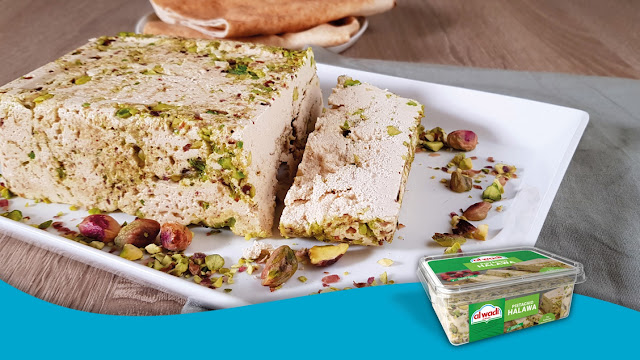Al Wadi Al Akhdar: 42 Years of Authentic Lebanese Food and Specialties
As a Lebanese-American who called Southern California home for two decades, access to anything from the motherland half a globe away was absolutely sacred. My brothers and I would squeal with delight whenever we’d visit the Middle Eastern stores in Anaheim and Orange County. Scanning the aisles, I remember ogling products that had been crafted in Lebanon and exported to communities across the world dense in the Lebanese diaspora.
One of my first and fondest recollections is the pistachio halawa by Al Wadi Al Akhdar. That circular tub with the forest green lid is forever seared in my memory. My parents always had two or three stocked in the pantry, alongside bottles of Al Wadi’s fragrant orange blossom and rose waters that Mom reached for regularly throughout the year, whether for baking maamoul (stuffed Lebanese semolina cookies) or concocting lemonade from scratch.
 |
| Al Wadi Al Akhdar’s pistachio halawa is crafted from 100% pure sesame seeds tahini, sugar, and halawa extract. |
In 2007, when I shipped out to Boston for grad school, I stumbled
across three neighboring shops in Watertown that imported a selection of
Lebanese products. Al Wadi Al Akhdar figured prominently in that lineup, and as
a student strapped for time, I greedily snatched up a number of their canned
goods: hummus
tahina, moutabal
batenjen (more famously “baba ghannouge”), chickpeas,
and foul
moudammas (or cooked fava beans). Tucking into one of those cans
transported me across the Atlantic and to the easternmost shores of the
Mediterranean where Lebanon, the land of my forebears, perches. I could taste
my heritage and its love of good food in every bite. Of course, I’d polish off
the meal with a heaping spoon or two of pistachio halawa. I even got my
Lebanese classmates hooked on halawa directly out of the tub, sans bread. To
this day, it remains an otherworldly treat for me.
 |
| A selection of canned Al Wadi Lebanese specialties (L-R: hummus tahina, chickpeas, moutabal batenjen, and foul moudammas). |
History, Founders, and Timeline
And that is the power of Al Wadi Al Akhdar, a brand that credits its inception in 1979
to co-founders Bechara Obegi and Frank Farage (watch the story here).
Lebanon was at the height of civil war, and food supplies were scarce. The two
men launched the company with three cornerstone products: hummus tahina, chickpeas,
and foul
moudammas. By 1984, the Dove processing factory had commenced production of
these Middle Eastern specialties, and the canned vegetables category came into
existence. Notably, Al Wadi began to export to France and the United States.
By the late 1980s, baba ghannouge was added to the product
repertoire, crafted using the traditional roasting method – and Al Wadi
uniquely lays claim to it whereas other brands have opted for grilling the
eggplant. Tahina, or ground sesame paste, and fruit jams made it to the market
during this decade. By 1992, Al Wadi had achieved market leader status in
Lebanese specialties and was the first to launch frozen vegetables in Lebanon.
In 1997, that leadership would extend to the category of canned vegetables.
Impressively between 2005 and 2010, the company’s revenue in
Lebanon alone doubled, which speaks volumes about Al Wadi’s brand recognition,
consumer confidence in its products, and all-around excellence in goods
produced. Over the past decade, Al Wadi has continued to plow ahead, garnering
accolades for being the first brand to establish a social media presence in
Lebanon and receiving recognition for its website at the regional Pan-Arab
Awards. The US magazine Bon Appetit
stamped its seal of approval on Al Wadi’s tangy pomegranate molasses. To meet
the surging demand for product research and development, the company
inaugurated a Laboratory of Innovation, which birthed the Al
Wadi organic range.
 |
| Al Wadi's laboratory of innovation was carved out of the company’s desire to be a trailblazer in new products. |
At present, Al Wadi products are sold across six
continents in more than 30 countries, including Australia, Canada, Chile,
England, France, Iraq, Kuwait, Morocco, New Zealand, Saudi Arabia, Spain,
Sweden, UAE and the US. In the more than four decades that the brand has
flourished both within and beyond Lebanon’s boundaries, its name has become
synonymous with Lebanese cuisine. That expertise is fostered by high-quality
raw ingredients coupled with the best and newest technologies to promote
stringent safety standards.
 |
| Presently, Al Wadi products are exported to approximately 30 countries across six continents. |
Major Product Categories
More than 150 products spanning around 15 categories are at the heart of Al Wadi Al Akhdar. Arguably the five most popular categories are
1. Lebanese specialties, representing authentic mezze dishes like hummus and baba ghannouge
2. Canned vegetables, packaged immediately after harvest
3. Frozen vegetables, frozen immediately after harvest to preserve nutritional profiles
4. Halawa and tahina, the former of which is a sweet confection, and the latter of which is an indispensable element in hummus and baba ghannouge
5. Floral waters and molasses, the former of which are essences distilled from rose and orange blossom flowers, and the latter of which refers to the natural sweetener “debs el remmen”
Al Wadi’s latest and greatest niche is the chilled
Lebanese range, encapsulating hummus and baba ghannouge presented in
convenient pouches, in addition to individually portioned hummus paired with
pretzels for dipping. These refrigerated products boast an enviable 12-month
shelf life and are free of preservatives. Isn’t that mind-blowing? Leave it to
the folks at Al Wadi to pioneer new frontiers!
 |
| Al Wadi's chilled range is the latest to hit store shelves. These Lebanese specialties are ideal for quick snack or meal ideas and are free of preservatives. |
Closing Remarks
One of the most reliable and effective ambassadors of our
beloved Lebanon has in fact been Al Wadi Al
Akhdar. Think about it. Our rich Mediterranean cuisine has landed us a spot
on the international food map, but it is brands like Al Wadi, with its
deep-seated commitment to quality, consistency, and authenticity, that bring
those delicious specialties directly within reach, no matter which corner of
the globe we find ourselves nestled in.
For me, and for my family that continues to reside in
California, Al Wadi Al Akhdar recreates the genuine tastes and flavors of the
Lebanese table in our home. When I flashback to those episodes of a fraught
student yearning for the comfort of the familiar, or of the young child eager
to embrace her culture and cuisine from the other side of the world, I realize Al
Wadi is permanently part of my past. And it will, by that same token, figure
squarely into my future.
 |
| The Al Wadi Al Akhdar dream team. The company stands for community, transparency, and professionalism. |
Enjoyed this post? Never miss out on future posts by following Beirutista here.






Comments
Post a Comment